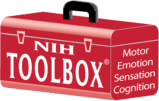Cognition
Cognition refers to the mental processes involved in gaining knowledge and comprehension, such as thinking, knowing, remembering, judging, and problem-solving. These higher-level functions of the brain encompass language, imagination, perceptions, and the planning and execution of complex behaviors.
The NIH Toolbox Cognition Battery, recommended for ages 7+, consists of tests of multiple constructs. It yields individual test scores and the following summary scores: Total Cognition Composite, Fluid Composite (includes Dimensional Change Card Sort, Flanker Inhibitory Control and Attention, Picture Sequence Memory (Form A), List Sorting Working Memory, and Pattern Comparison tests), and Crystallized Composite (includes Picture Vocabulary and Oral Reading Recognition tests).
The NIH Toolbox Early Childhood Cognition Battery is recommended for ages 4-6. It produces individual test scores and an Early Childhood Composite Score (includes Dimensional Change Card Sort, Flanker, Picture Sequence Memory (Form A), Picture Vocabulary, and Speeded Matching).
Other Cognition tests can be administered to understand the participant’s functioning, but are not required for the calculation of the composite scores.

